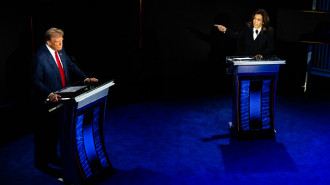Palestinians condemn Trump's 'Deal of the Century' peace plan
Palestinians staged protests on Tuesday against US President Donald Trump's so-called "Deal of the Century" Israel-Palestine peace plan, hours before it was unveiled in Washington.
Thousands demonstrated in the besieged Gaza Strip, burning pictures of Trump and the American flag, while further rallies were planned for the coming days.
Details of the initiative remained under wraps on Tuesday afternoon, but Palestinians feared the plan would heavily favour Israel, whose Prime Minister Benjamin Netanyahu was in Washington to attend the White House unveiling.
In a rare event, rival Palestinian factions Hamas and Fatah agreed to meet in the West Bank city of Ramallah to discuss a response to Trump.
Trump later released his plan, in preparation since 2017, at the White House together with his close ally Netanyahu, who is battling corruption charges which he denies and campaigning for March 2 elections.
The Palestinians, who accuse Trump of pro-Israel bias after his administration has unwaveringly backed Israeli objectives, were not talking part in the Washington event.
And Trump's vision of peace is almost certainly a non-starter for most Palestinians, including those in the Jordan Valley, a strategically vital area that constitutes around 30 percent of the West Bank.
Netanyahu said on Tuesday the Israel-Palestine peace plan would allow Israel sovereignity over the Jordan Valley, indicating a likely green light from Washington annex the fertile area, which is home to around 65,000 Palestinians, according to the Israeli anti-occupation NGO B'Tselem.
The Israeli army announced it was beefing up forces in the area ahead of Trump's announcement, with Defence Minister Naftali Bennett pledging the military was "ready for any scenario".
Future of settlements
|
|
Netanyahu added that the US would recognise its illegal settlements in the occupied West Bank as part of the plan, a move which will surely be unacceptable for Palestinians and would render an independent Palestinian state as advocated in the peace plan nearly impossible.
Settlements home to around 600,000 Israeli are dotted across the West Bank. Their annexation into Israel proper would deny Palestinians hope for a territorially contiguous state.
Extreme right-wing Israeli settlers had initially been upbeat about Trump's proposals.
But after being briefed on the plan by US officials, leaders of the Yesha Council umbrella group that represents settlers living in the West Bank said they were now "very concerned".
"We can't agree to a plan that includes forming a Palestinian state, which will constitute a threat to Israel and a great danger to the future," said council head David Elhayani.
Israeli Transport Minister Bezalel Smotrich of the far-right Yemina union stressed in an interview with army radio that his party "won't under any conditions agree to recognition, whether explicit or implicit, of a Palestinian state".
The Arab League has said it will convene an urgent meeting on Saturday in response to the unveiled peace plan.
Hossam Zaki, the pan-Arab body's deputy secretary, told reporters on Tuesday that Palestinian President Mahmoud Abbas would attend to discuss the "so-called Deal of the Century".
The grand imam of Egypt's prestigious Al-Azhar mosque and university lambasted the plan at a conference in Cairo in the presence of many of the Sunni world's leading religious scholars.
"Our identity as Arabs and Muslims is over... I felt totally ashamed watching Trump with the Israeli leader," Sheikh Ahmed al-Tayeb said.
"They're the ones planning, talking, controlling and solving problems for us and there's no Arab or Muslim," Tayeb added.
'A big step towards peace'
|
|
"Today, Israel takes a big step towards peace," Trump told a White House news conference, standing alongside visiting Prime Minister Netanyahu as he revealed key points of the plan already strongly rejected by the Palestinians.
"My vision presents a win-win opportunity for both sides, a realistic two-state solution that resolves the risk of Palestinian statehood to Israel's security," Trump said.
The plan was warmly welcomed by Israel's prime minister, who called it a "historic day" for the Jewish state.
The plan, Trump said, proposes a four-year freeze of Israeli development in the area eyed for a future Palestinian state.
"Jerusalem will remain Israel's undivided, very important, undivided capital," Trump stressed.
But the plan would also provide the Palestinians with a capital in occupied East Jerusalem, he said, while indicating that the West Bank would not be cut in half under the plan.
"We will also work to create a contiguous territory within the future Palestinian state, for when the conditions for statehood are met, including the firm rejection of terrorism," Trump said as he called on the Palestinians to turn their back on the Hamas movement.
Calling it a "historic opportunity" for the Palestinians to achieve an independent state, Trump said he had written Tuesday to Palestinian president Mahmud Abbas to enlist his support for the plan.
No Palestinian official was present at the launch although the ambassadors from three Arab nations - Oman, the United Arab Emirates and Bahrain - were at the White House.
"This could be the last opportunity they will ever have," Trump said.
"Palestinians are in poverty and violence, exploited by those seeking to use them as pawns to advance terrorism and extremism," the president added.
"They deserve a far better life."

![Palestinians mourned the victims of an Israeli strike on Deir al-Balah [Getty]](/sites/default/files/styles/image_684x385/public/2024-11/GettyImages-2182362043.jpg?h=199d8c1f&itok=xSHZFbmc)


![The law could be enforced against teachers without prior notice [Getty]](/sites/default/files/styles/image_684x385/public/2178740715.jpeg?h=a5f2f23a&itok=hnqrCS4x)
 Follow the Middle East's top stories in English at The New Arab on Google News
Follow the Middle East's top stories in English at The New Arab on Google News

![Voters in Michigan [Getty]](/sites/default/files/styles/image_330x185/public/2182490468.jpeg?h=a5f2f23a&itok=XMi_sWGX)
